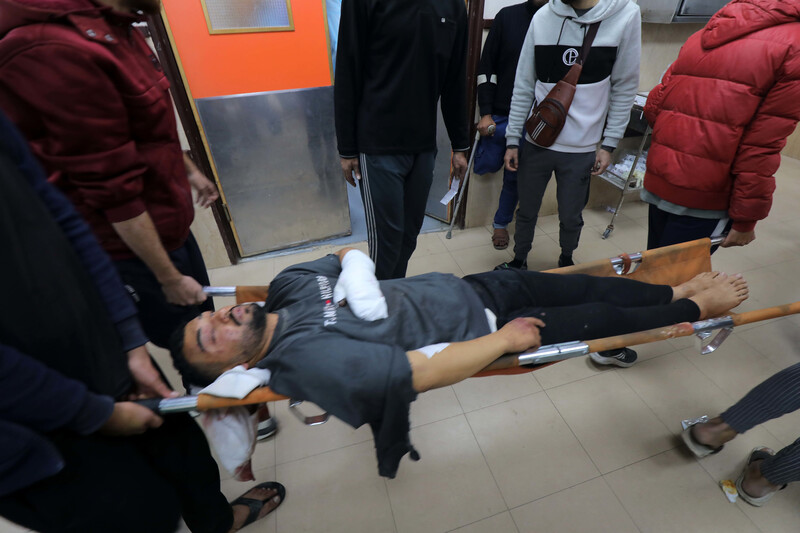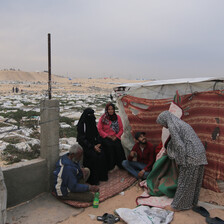The Electronic Intifada 12 December 2023

Hospitals trying to treat injured people have very little medicine.
APA imagesIsrael is not satisfied with killing Palestinians using missiles, bombs, artillery shells and bullets. It also kills in more insidious ways: by denying food, water and medicine to the people of Gaza.
Worse, Israel deprives Palestinians injured in its violent attacks of the chance of being rescued or dying with the least amount of pain.
The genocidal war on Gaza has involved continuous attacks on the healthcare system.
According to the World Health Organization, 24 out of Gaza’s 36 hospitals were damaged between 7 October and 7 December.
Because of Israel’s attacks more than 50 out of Gaza’s 72 primary health facilities are no longer in service. The rest are only functioning partially.
Israel has killed almost 300 Palestinian healthcare workers and abducted more than 40 in that period.
The remaining workers have been toiling away for more than two months. Not only are they burnt out, they lack food, water and shelter for themselves and their families.
Israel’s destruction leaves an irreparable void in Gaza’s health services, which were already overstretched before 7 October.
There is a shortage of everything from cannulas and syringes to imaging devices.
Wounded people – who could be saved by urgent bleeding control or by the right doses of antibiotics – are dying because such services are not available and because it is not possible to access healthcare.
The infection of wounds leads to complications and eventually death.
Doaa Yousuf is a family doctor. She was a co-supervisor during my internship at the Sabha al-Harazeen Primary Care Center in the Shujaiya neighborhood of Gaza City.
“The healthcare system is completely shattered,” Doaa said. “In other words, there is no system.”
Doaa is now working at a primary care center in Rafah, Gaza’s southernmost city.
Hundreds of thousands of patients are now left without medicines. Pharmacies do not even have very simple painkillers such as paracetamol.
Empty shelves
Before the current war – and with Gaza blockaded since 2007 – medications for chronic diseases and infections would start to run out in the last 10 days of each month. Patients needing those drugs would have to wait until the beginning of the following month.
Then Gaza’s health ministry would provide new supplies. That would often involve borrowing medicines from clinics run by the UN agency for Palestine refugees (UNRWA) or buying medicines at high prices from private pharmacies.
Now, there is almost no medicine in Gaza. The shelves are bare in governmental and UNRWA clinics and private pharmacies, if those pharmacies are still operating.
More than 220,000 people with high blood pressure do not have medicine.
Around 71,000 people with diabetes do not have insulin or anti-diabetics.
Some 1,100 people who need kidney dialysis face major and potentially life-threatening complications because the healthcare system has been forced to collapse.
In Gaza, more than 2,000 people are diagnosed with cancer per year. They include approximately 120 children.
The two hospitals specializing in cancer care have been attacked.
“Our center receives 600 patients per day,” Doaa Yousuf said. “We are seeing a huge number of infections. Most of them are respiratory, skin and gastrointestinal. Chickenpox, lice and scabies, flu, gastroenteritis and hepatitis A are extremely common.”
People in Gaza are living in inhuman conditions. Displaced people do not have adequate shelter or clothing in the harsh winter weather.
About 700 people share each bathroom in UNRWA schools. That means adults and children have to queue for hours before they can use a bathroom, with scarcely any water.
Giving birth amid a genocide
Families have to cook and bake on open fires. Keeping kitchen utensils clean is often impossible.
Taking a shower has become a luxury. Vast numbers of people have gone for long weeks without showering.
Mountains of garbage can be found all over Gaza. Waste collections are not taking place – it is too dangerous for such services to be provided.
Dead bodies are scattered in the streets and under the rubble of buildings. Nobody can access them.
Under these circumstances, communicable diseases can spread like wildfire.
The primary care center where Doaa works has a maternal and newborn section.
“Pregnant women who need special care for high blood pressure and diabetes can’t find the right medicine,” she said. “They use whatever is available and hope that nothing serious will happen. Newborns and their mothers are not able to receive proper care. Or if they do get care, it’s not in the appropriate environment. Babies are not getting their vaccinations or examinations they need.”
Promoting breastfeeding is extremely difficult. “And getting formula is impossible as the prices are astronomical,” Doaa said. “That’s if it is available.”
It is estimated that there are more than 50,000 pregnant women in Gaza at the moment.
Mothers who have given birth in hospitals since the war began have been discharged as fast as possible. Many of them are now staying in schools.
One of my cousins has given birth to a girl. My cousin had previously lost two babies.
Her new daughter is healthy so far. Both the mother and child, however, are staying in a crowded school – a very unhealthy environment.
There are around 30 people in the classroom where my cousin is staying. Most are kids.
When my cousin needs the bathroom, she has to visit a neighbor’s home. The bathroom queues at the school are too long.
My cousin is starving. How is she supposed to look after her daughter?
My cousin is among 5,500 women in Gaza who gave birth in the past month.
She is exhausted and cries every day.
Everyone in Gaza is mentally scarred by this horrific war. They are struggling for the most basic necessities in life.
Gaza is reeling under the weight of a humanitarian catastrophe. The need for an immediate ceasefire cannot be overstated.
If the war continues, the catastrophe will get much worse.
Sewar Elejla was formerly a doctor at al-Shifa hospital in Gaza. She is now a Canada-based researcher.





